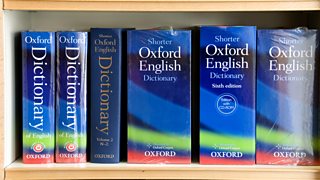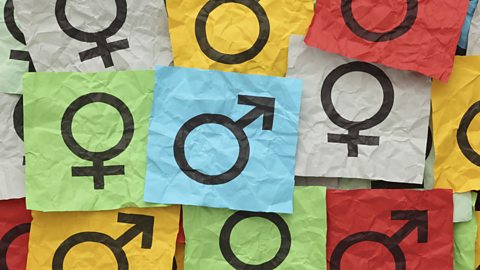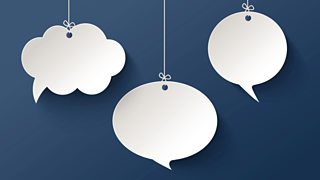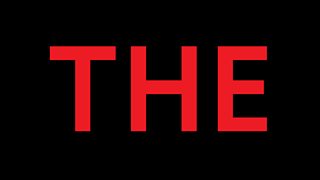Women and words: why language matters
From ‘bossy’ to ‘battleaxe’ and ‘spinster’, many of the words used to describe women are laden with negativity, judgement and criticism. In Word of Mouth, Nikki Bedi and Professor Deborah Cameron explore how sexism is reflected in the English language and discuss why the words we choose are important. Here are a few of the interesting issues they uncover.

Why dictionary entries for ‘woman’ need a rewrite
In March 2020, an open letter called on the to update its entry for the word ‘woman’. The dictionary, which is used in many mobile phones, offers words such as ‘bitch’, ‘bird’, ‘wench’, ‘petticoat’, ‘bint’, ‘mare’, ‘biddy’ and ‘filly’ as alternatives to ‘woman’. Under examples of how ‘woman’ could be used in a sentence, it includes the phrase: “I told you to be home when I get home, little woman.”
-
![]()
Word of Mouth: Words Used About Women
Guest presenter Nikki Bedi talks to Professor Deborah Cameron about words used to talk about women.
The letter explained: “Synonyms and examples such as these when offered without context reinforce negative stereotypes about women and centre men. That’s dangerous because language has real world implications. It shapes perceptions and influences the way women are treated.”
Can a dictionary really be sexist?
Deborah Cameron, Professor of Language and Communication at Oxford University, explains that modern dictionaries aim to record how language is actually used by people, and are based on a huge sample of millions or billions of words. As a result, they reflect sexism that already exists in our history and culture.

However, Cameron says, “some sexism creeps into dictionaries because of their own editorial decisions”. For example, she explains, synonyms like ‘bezom’, ‘filly’ and ‘petticoat’ are out of date and offensive. While those words may have a place in a historical dictionary or thesaurus, they don’t need to be in the dictionary you get with your phone.
The Oxford Dictionary is reviewing its examples to address bias and stereotyping. But it’s not the only one that needs to do it – Cameron says this kind of sexism is a “really general problem”.
Why men get more space on the page
The entry for ‘man’ in the Oxford Dictionary is much longer and more detailed than the one for ‘woman’. But, Cameron explains, this is difficult to rectify because of the two words’ unequal linguistic histories.
The entry for ‘man’ in the Oxford Dictionary is much longer and more detailed than the one for ‘woman’.
“The thing is, you can’t really make them balanced because the words ‘man’ and ‘woman’ genuinely are not parallel terms, because ‘man’ has both a sex-specific meaning (a male person), and a kind of generic meaning (human being) ... And it’s that imbalance that the length of the entries is reflecting.”

The ways women are being forgotten on a daily basis
A range of case studies, stories and new research highlights ways women are ‘forgotten’.
The inequality doesn’t end there. Cameron says the words of privileged white men make up a disproportionate number of the sources cited by dictionaries. Although things are changing, she points out that “a privileged subset of men still actually dominate the public sphere. So if you’re taking your data from, let’s say, the news media, political speeches, scientific journals, even debates on the internet, you are going to end up with more words that were written and spoken by men than women, and also more words about men.”
Words for women in positions of power
Language and power are associated in other ways too. Nikki Bedi points out that female politicians are often described using a particular set of terms that wouldn’t be applied to men. Cameron believes this vocabulary harks back to history and shows how uncomfortable our culture still is with female authority.

“Women [are put] in boxes, like there’s the battleaxe or the iron lady, or else they’re just, you know, domestic tyrants. They’re mummy, nanny, matron, the headmistress, the head girl, the schoolmarm. You know, it’s as if we can only imagine female authority in terms of the domestic sphere where historically women had power over children and servants.”
Cameron has studied the media coverage from the 2015 general election, when three female party leaders took part in TV debates. She found that “this kind of stereotyping was incredibly common... And until I did that analysis, I think even I hadn’t realised how consistent it was.”
What insults can tell us about sexism
As well as being personally hurtful, Cameron says, insults are designed to undermine a person’s standing in their community. So, by comparing the words used for men and women, we can learn about differing social norms and expectations through history.
The fact that there are so many terms of abuse that judge or criticise women’s sexual behaviour, such as ‘slag’, ‘strumpet’ and ‘trollop’, shows how important sexual reputation has been for women in society, in a way that it hasn’t for men. “To impugn a woman’s chastity could, historically, have really very serious material social consequences. And even today, these are insults that girls and women fear,” Cameron says.
By contrast, insults aimed at men are often things designed to undermine their masculinity, such as ‘sissy’, ‘cuck’, ‘big girl’s blouse’ or ‘girly swot’, and this reflects women’s historically lower status in society. “You’re comparing a man with his social inferiors, women, in order to kind of unman and degrade and shame him,” Cameron explains.
How words about women have changed
The meanings of many words used to describe women have changed over time. Examining how they’ve evolved can uncover some important insights. Here are three examples from Word of Mouth:
Lady
The words ‘lord’ and ‘lady’ both originally referred only to members of the aristocracy. But while ‘lord’ has held onto its status, ‘lady’ has drifted steadily down the social scale. By the early 20th century, society was split into upper and middle class ‘ladies’ and working class ‘women’. Today, ‘lady’ is used as a polite way to refer to women in general. Some people view it as a kind of euphemism used by people who are squeamish about saying the word ‘woman’.
Spinster
‘Spinster’ has its origins in the job of spinning yarn, which was often (but not always) done by young women. It was the legal term for an unmarried woman from the 17th century right up until 2005 when civil partnerships were introduced. However, the word is more often used to refer negatively to older single women, which reflects historical stigma around a woman remaining unmarried. By contrast the male equivalent, ‘bachelor’, has retained mostly positive connotations.
Slut
The derogatory term ‘slut’ has been found in writing from around 1400. Originally, it was used to mean both an untidy, dirty or slovenly woman, and one who is sexually promiscuous. But over time, the domestic connotations have largely been lost and, like many insults for women, the word now has a primarily sexual meaning. More recently, some women have begun reclaiming the word as part of the SlutWalk protests against sexual violence and the shaming of women who have been assaulted.

The influence of sexism on science
Sexism in science, its as old as...science.
Why the words we use matter
The history and hidden implications of words can shape the way we see things. “We don’t just learn about the world from our own direct experience, we learn from the conversations we have, the stories we’re told, the representations we encounter via the mass media,” Cameron explains.
At the same time, language has the power to influence the world around us. “Many of the words we’ve been discussing are weapons. They are used to police and shame and silence and wound. But on the plus side, language is also one of the best tools we have for sort of reflecting and raising awareness about that... And that doesn’t change the world on its own, but I think it’s a necessary step along the way.”
More from Radio 4
-
![]()
Word of Mouth: Words Used About Women
Guest presenter Nikki Bedi talks to Professor Deborah Cameron about words used to talk about women.
-
![]()
How do metaphors shape your life?
What they are, why do they exist and why do we need them in our language?
-
![]()
The most powerful word in the English language
How did a word which means nothing come to dominate our language?
-
![]()
12 wonderful words we should all be using
Who doesn’t like sounding clever? Try slipping these words into your conversations.




